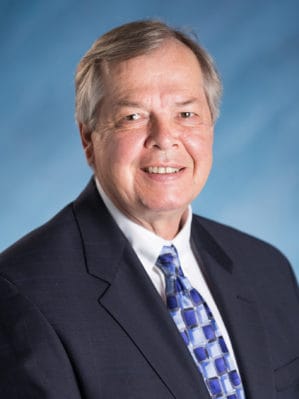Looks Forward to Refocusing His Artistic Talents

As otolaryngologist J. Michael Key, M.D., transitions into retirement after 38 years at the University of Arkansas for Medical Sciences (UAMS) and Arkansas Children’s Hospital, he’s not quite ready to put aside his tools. Now, however, instead of transforming the faces of children — in the process often transforming their lives — the masterpieces he creates will be made of wood.
“I’m a woodworker and very good at carving, and I have a big workshop that I’ve been cleaning up and organizing,” said Key, a pediatric facial plastic surgeon who retired Jan. 16 after 43 years as a practicing physician, including nearly four decades on the faculty of the UAMS College of Medicine Department of Otolaryngology-Head and Neck Surgery.
He also has some classic cars that need restoring, like the 1976 red Porche that his wife, researcher Deanne King, M.D., Ph.D., keeps reminding him just needs a rebuilt engine. He’s also looking forward to getting back to some handyman chores.
“One of the things I’ve done all my life is fix things,” Key said. “Problem solving and fixing. I can do electrical. I can do plumbing. I can do carpentry.” Once, he even built a lake home.
He said the joy and purpose he feels while problem-solving is what attracted him to a career in facial plastic surgery, an otolaryngology subspecialty where he was able to create, reconstruct, reposition, or reshape the ears, noses, and faces of children while applying an artist’s sense of symmetry. Similarly, he said, “I’ve always thought my hobbies made me better in medicine.”
One of the best parts of his subspecialty, he said, was being able to see the results immediately. Another was that no matter how many surgeries it took to reconstruct a child’s ear or repair a cleft nose to accommodate their growing bodies, the children were always grateful afterward.
In those cases in particular, he said, “I always thought that I was really making a difference.” Whether it was a relatively simple surgery to set back prominent ears or the most difficult kind — constructing functional and normal-looking external ears for a child born without them — “you’d be surprised at how magical that was for some of those kids,” he said. “I would take cartilage from the rib cage to make the ear, and the process usually required four operations over a one-year period,” Key said. “The beauty of the kids is they always heal really well,”
Another of Key’s specialties was reconstructing cleft noses, which often accompanied cleft lip and palate surgeries. Key said the surgery typically can’t be performed until a child reaches the age of six or seven. The goal was always to complete the procedures by the time the child reached second grade because that’s when other children begin noticing anatomical differences and making remarks that can negatively affect the patient’s psychological well-being
Key also loved to teach. “One of the reasons I stayed in academics is I really like teaching and learning,” he said. “There’s nothing like young minds coming up to you and asking why you’re doing something the way you’re doing it, causing you to pause to think about it and explain it, and, sometimes, change it.”
At a recent departmental going-away party for Key, John Dornhoffer, M.D., chair of the UAMS Department of Otolaryngology-Head and Neck Surgery, said that Key will be missed. “I wish Mike all the best in his retirement,” Dornhoffer said. “Not only has he been a great colleague — loved by all for his integrity, wisdom, and sense of humor — he is also a very good friend. I will certainly miss seeing him at work!”
A native of western North Dakota, Key earned an associate’s degree in medicine in 1979 in North Dakota, then completed his medical degree in 1981 at Baylor College of Medicine in Houston. After a general surgical internship at Baylor, he finished a four-year residency in otolaryngology at UAMS. He left to complete a fellowship in facial plastic surgery before returning to UAMS in 1985 as a faculty member.
Now 71, Key said he retired only after mandatory rules requiring him to begin taking Social Security at age 70 prompted him to wonder why he was still working. He started thinking about how nice it would be to have time to devote to the myriad interests he has always maintained outside the field of medicine.
Key said he often hears people say they might not have enough to do to keep themselves busy during retirement, but that’s not a concern of his and “it’s one of the reasons I won’t have regrets about retirement.”
Asked if he had any advice for incoming otolaryngologists interested in pediatric facial plastic surgery, Key said, “It’s a very desirable surgical subspecialty” that has become very competitive, so it’s important to maintain academic excellence. To illustrate the point, Key said UAMS’ department of otolaryngology is well-regarded nationally, which makes it a top choice of residency applicants. In fact, he said, UAMS fields about 225 applications each year to fill three residencies, which allows the department to “choose from the top of the barrel.”
To be successful in pediatric facial otolaryngology, he said, “You can’t be a so-so student. You can make it what you want to make it,” he said. “We call ourselves the Cadillac of surgical sub-specialties — no offense to other subspecialties — but I always say we’re the Porche of the subspecialties.”
